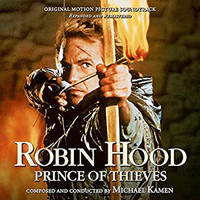- Composed by Michael Kamen
- Intrada / 220m (score 132m)
While not a great film, Kevin Reynolds’s 1991 mega-hit Robin Hood: Prince of Thieves is at least better than any of the 12,000 further Robin Hood adaptations that have come since. Kevin Costner was riding the height of his fame at the time; I will never not roll around the floor laughing when I think of his surfer-accented “tonight we will sup with my father in Notting-HAM” as he sets off on-foot from Dover (a journey that would take approximately five hours by car even if you didn’t – as Costner does – go via Hadrian’s Wall, which is several hundred miles in the wrong direction).
They don’t really make movies like it any more though, which is a shame, and two people who gave it their absolute all make it very watchable – Alan Rickman, delicious as the Sheriff of Nottingham, and the great Michael Kamen, delivering his most popular and most famous film score. I’ve always been a big fan of Kamen but have always felt that for some reason a lot of his more famous scores aren’t really the ones I would put at the top of my own list – this is a notable exception.

There’s no hanging around for the main theme – there it is in all its glory over the opening titles, that little rhythm that opens it (one which Kamen put in almost all his scores, in fact – his version of James Horner’s four-note motif) before the horns herald the heroic theme’s triumphant first appearance. It’s a great theme, one which demands to be played very loud indeed, and Kamen gets so much mileage from it.
We’re straight into one of the score’s big action sequences next, the catchily-titled “The Letter / Robin’s Hand / And His Merry Men / Home”. Kamen was, of course, a master of action music but what really sets this score’s apart from the famous examples that came before is how bright it all is – at last the composer had a film which allowed him to paint with primary colours in his action music rather than shades of grey, and he approached that with some relish.
There are two distinct parts to the love theme, both of which first appear in “Robin Gives Marian Ring / Escape to Sherwood” (these track titles are so bad) – the first, the less well-known of the two, is tender and somewhat tentative, its delicateness being so appealing; the second, familiar to so many from its adaptation into the Bryan Adams song heard over the movie’s end title, is so ravishing and romantic. Its initial appearance is somewhat low-key and leads into a terrific sequence of action music but by the time we get to “Marian at the Waterfall / Camp” it’s as sweeping as anything.
The film is dotted with light-hearted moments courtesy of the merry men and Kamen adds his own comic touches to these, with little harpsichord runs and some deliberately overwrought swashbuckling (“Little John Fight” – helpfully retitled to “Little John Fight Pt. 1 & Pt. 2” on the latest album, which finally clears up the confusion I’ve been feeling while listening to the earlier album as to exactly what scene “Little John Fight” was underscoring – is the best example of the latter and the closest Kamen ever comes to being Korngoldian).
Interestingly, in the second half of the moving “Village Destructo (Alternate #2)/Village Destroyed Pt. 2” we hear what sounds like a dry run for the main romantic theme Kamen would write a few years later for Don Juan de Marco (which would also be turned into a successful Bryan Adams song) – it’s not quite as romantic in this setting, obviously, but certainly stirring.
Always a highlight of the score has been the spectacular version of the main theme and other fanfares and flourishes which appear in “Training Sequence” (given the far superior name of “Courage / Training Sequence Pt. 1 & Pt. 2 / Troops” on this release). Not long afterwards there’s more of that sound plus the bright, lighthearted side of the score in “Merry Men Plot the Ambush / The Merry Men Ambush Gisborne”.
“Celt Battle Pt. 1, Pt. 2 & Pt. 2A” (seriously) is a wonderful piece of action music, with a somewhat different sound from the rest of the score – darker, more intense, the bright sparks absent for once (but it’s still great fun). “Duncan’s Death” isn’t a barrel of laughs either – low strings dominate, Kamen wrings a lot of emotion out by keeping things simple, reprising the theme from “Village Destroyed”.
The last half hour or so are a pure action/adventure. It starts in “Circle of Stones / Plans for Rescue / Will Captured” with that familiar cello rhythm given an extended airing at the opening before the violins swell up and we head into a fantastic piece of tension-building by Kamen which eventually leads into some wonderful action. But the real gem is the 13-minute “Rescue Marian / Robin Fights the Sheriff / Finale Pt. 1 & Pt. 2” (ffs) which is an absolutely rollicking action spectacular, one of the best of the 1990s, cycling through the main themes in between breathless workouts for the whole orchestra as one of the great masters of action music really flexes his muscles. One more spectacle awaits, in the now-titled “Finale Pt. 3 & Pt. 4” (FFS!!!) which builds up to a gigantic climax which I’ve always considered one of the most stirring endings to any film score I’ve ever heard. (I remember an old Silva Screen recording – 20+ years ago – which did a little suite of that ending pasted on to the overture and it worked so very well, it’s a shame that arrangement never became a standard in film music concerts.)
This is the third different album release of the score. For the original, Kamen carefully assembled suites of the most important material and it was a fine album, greatly expanded upon by Intrada’s first release. But they couldn’t find all the music at the time – now they have, this mammoth 4-CD release (one CD of which replicates the score selections from the original album) is clearly the definitive one. The sound is crisp and sharp – as it was on the previous two, to be honest – and some of the new material is particularly welcome, particularly the never-before-heard unused end title piece (a surprisingly delicate orchestral take on the Adams song). There are only about ten minutes of extra score on it (the other new material is mostly alternate takes, plus a bit of source music) so whether you can justify the $35 expense for so little new music is bound to be a concern, but if you love the score as much as I do then I’m sure you’ll cave eventually.
The only thing that keeps the latest release from being absolutely definitive is that it doesn’t feature the songs, and as is customary with Intrada source cues are mysteriously placed as part of the main album programme and clearly need removing (unless you seriously want to listen to “Generic Witch Ambience Pt. 1 & Pt. 2” right when the score is building up towards its spectacular finale). Also familiar to buyers of these things, some cues that were combined together on the previous album have now been separated while others than were separate have now been combined. You may have already gathered that I am not a big fan of the track titles on this version but frankly that’s a trivial concern.
The important thing is that this is one of the finest scores written by one of the greatest film composers of his generation, a man whose warmth and kindness truly set him apart – but those were qualities which he hadn’t really been able to demonstrate musically in his most high-profile projects before this point (Die Hard was not crying out for a tender love theme, after all). It’s a perfect score for its film and one of the few that has a scope big enough to truly justify such a mammoth album release. This was a transformative film for Kamen and greatly broadened the range of big blockbusters he was able to work on in the years that followed – how tragic it is that there were nowhere near enough of those years.
Rating: *****
facebook.com/moviewave | twitter.com/MovieWaveDotNet | amazon.com












> first sentence
Aww, no love for Men in Tights? It’s actually my favorite Robin Hood movie lol. The score probably wouldn’t be anything to write home about (although I do find myself humming Maid Marian’s anthem every once in a while).
All I know from this film is the title theme (and who hasn’t heard it). Good to know the rest of the score holds up!
Thanks for yet another useful (and funny) review. Do you remember which Silva compilation it was? There was a similar combined suite on the Telarc-Kunzel compilation ‘The Great Fantasy Adventure album’ too.
Thanks
Thanks for doing a great review James. I agree with you about the cue titles – I have reverted back to the 2cd version to rename some of the titles to make them more user friendly.
But there is no getting away from the fact that Intrada have done a sterling job in covering this magnificent, epic, powerful and gorgeous score!
Heartbreakingly I think I was one of the last to purchase the previous Intrada edition…so, you can imagine how I felt seeing this extra expanded edition released.
I understand economics and finding new material, but, it would have been nice to be offered a discount for an upgrade or the new tracks as a download.
I agree, Kamen created a beautiful score for this film and I’ve just taken delivery of the Lethal Weapon boxset from Lalaland!